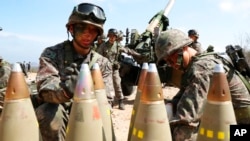Seoul has reiterated its decision not to send lethal weapons to Kyiv following the leak of Pentagon documents reportedly showing top South Korean officials deliberating whether to sell artillery shells to the U.S. because of worries that the ammunition could end up in Ukraine.
“The government’s policy of not providing lethal weapons to Ukraine remains unchanged,” a spokesperson for the South Korean Defense Ministry told VOA’s Korean Service on Wednesday.
“The Republic of Korea and U.S. government have been discussing ways to support Ukraine’s protection of freedom. However, we cannot confirm the details of the discussion,” the spokesperson continued without elaborating.
South Korea has been providing humanitarian aid to Ukraine since Russia invaded in February 2022. It also joined the U.S. and Western democratic countries in sanctioning Russia for its invasion of Ukraine.
But as the West has been increasing the amount and kinds of weapons supporting Ukraine’s defense against Russia, Seoul has stopped short of providing lethal aid even though Washington has been looking to buy artillery shells from Seoul since late last year as a way to replenish U.S. stockpiles exhausted from suppling Kyiv.
In January, Pentagon spokesperson Lieutenant Colonel Martin Meiners told VOA’s Korean Service that Washington was still in talks with South Korea’s “nongovernment industrial defense base” for “potential sales of ammunition.”
At the time, Seoul refrained from ammunition sales to avoid upsetting Russia, which had hinted that it could resume military cooperation with North Korea if South Korea assisted Ukraine.
Seoul’s deliberation
Seoul’s deliberations about selling the ammunition to the U.S. could be gleaned from the leaked Pentagon documents that allegedly reveal U.S. intelligence services spying on top South Korean officials, according to The New York Times.
South Korean national security adviser Kim Sung-han, who resigned in March over planning issues related to President Yoon Suk Yeol’s upcoming visit to Washington, and Secretary for Foreign Affairs Yi Mun-hui were concerned that the U.S. would not be “the end user” if Seoul sold ammunition to the U.S., according to the Times report.
Soo Kim, a former CIA analyst and policy practice lead at the Washington, D.C.-area consultancy LMI, said Seoul’s concern about extending arms support to Ukraine was nothing new.
“Seoul’s deliberation over support to Ukraine has been widely known since the beginning of the war,” Kim told VOA Korean. “But the leak itself makes the issue seem all the more serious and a point of friction between Seoul and Washington.”
The South Korean newspaper Dong-a Ilbo, citing a government official, reported Wednesday that South Korea was to lend rather than sell 500,000 rounds of 155 mm artillery shells to the U.S.
Supporting Ukraine
Scott Snyder, director of the program on U.S.-Korea policy and a senior fellow for Korea studies at the Council on Foreign Relations, said, “The leaked documents represent an impediment to South Korea’s cooperation with the U.S. to support Ukraine to the extent that they may raise the domestic political cost to Yoon of doing so.”
The allegation of U.S. espionage has sparked criticism in South Korea. Opposition Democratic Party leader Lee Jae-myung said the Yoon government needed to secure “an official apology” from the U.S. and a “guarantee” it would not spy again.
Bruce Klingner, senior research fellow for Northeast Asia at the Heritage Foundation, said, “The South Korean opposition party predictably is trying to use the issue to undermine support for the alliance and to score political points against President Yoon.”
Yoon’s office issued a statement Tuesday saying the defense chiefs of South Korea and the U.S. agreed that significant portions of the leaked Pentagon documents contained fabricated information.
Washington expects more
Evans Revere, a former State Department official with an extensive experience negotiating with North Korea, also questioned the validity of the leaked document. But he said Seoul’s caution about providing direct arms support to Ukraine had concerned some in the West.
“It’s no secret, quite frankly, that there has been some level of concern in Washington, just as there has been some level of concern in Western Europe, that South Korea has not done as much as it could or should in terms of supplying Ukraine,” said Revere.
Describing South Korea as “one of the most formidable manufacturers of sophisticated arms and equipment in the world,” Revere said that while it was good to have Seoul supporting the West and pushing back against autocratic countries like Russia, the government needed to decide “what South Korea is prepared to do” that would “really make a difference in the ability of democracy to survive.”
South Korea was the eighth-largest global exporter of arms in 2017-21, according to a 2022 report by the Stockholm International Peace Research Institute.
Seoul’s dilemma
Terence Roehrig, a professor of national security and Korea expert at the U.S. Naval War College, said, “South Korean officials have sought to craft a careful policy that supports Ukraine along with the West and stand up to Russia, while also avoiding actions that provoke Russia into worsening security on the Korean Peninsula through support for the North.”
He continued, “Seoul has a delicate balancing act to play and its arms sales to others is a way of supporting the Ukrainian war effort without provoking Russia, though it’s not clear if the Kremlin sees the difference.”
Moscow has placed South Korea on a list of countries that commit “unfriendly actions” along with other countries that sanctioned Russia in March, according to Tass, a government-affiliated news outlet.
Revere, the former State Department official, said, “There is nothing that Russia is going to do to help South Korea when it comes to North Korea.”
He continued, “North Korea has become a de facto partner of Russia by supporting the Russian position on Ukraine, criticizing NATO, and perhaps even providing military support to the Russians.”
Kim Hyungjin contributed to this report.










